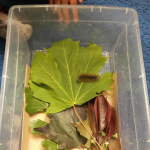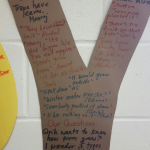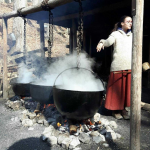We will be investigating ways to bring nature into the classroom for a better understanding of the natural world in order to learn to respect the environment. We hope to use technology to communicate their learning of inquiries. We want students to see and explore the environment through both indoor and outdoor activities and resources. We want kindergarten students to see themselves as scientists, and research their key areas of interest with a goal of becoming eager for science inquiries, as well as caring, responsible citizens.
Team Members
Anna Graziotto
Peel District School Board
Nancy Demko
Peel District School Board
Professional Learning Goals
We discovered how giving students experiences to visit and explore natural environments (e.g., schoolyard, apple orchard, sugar bush) in their community gives them a foundation for understanding the importance of the natural environment (e.g., trees give us food).
We also realized that the tablets we purchased with intentions of research became a challenge as students did not have the ability to research independently. Students needed direct assistance from a teacher or adult in the room to spell and read text on their topic of choice.
Through these experiences, we learned how students made connections as they became excited about science and nature in their own community (e.g., they would come in and share their discoveries, such as the duck who laid eggs in our school garden).
Activities and Resources
We started an inquiry when some students discovered a pear tree in the schoolyard. We used our five senses to start an investigation of several different fruits. We decided to visit an apple orchard in our community called Dixie Orchards. We also explored changes in the seasons and the effect on plants and animals in our community. We used books, videos, observations and our trip experiences to talk about the changes in our environment. We arranged to have Scientists in School come and provide more focused science activities. The students explored five stations: outer space, dinosaur fossil digging, making a mini volcano erupt, colour mixing and making fish prints. Next we took our students to a local conservation area where they learned about the Canadian maple tree and the process of turning sap into maple syrup. As spring approached, we provided the students with planting materials to help them learn and appreciate how they benefit our lives. Students had the chance to investigate and compare rocks. Students also enjoyed the planting experiences with vegetable seeds and herbs. They learned about the parts of the plants and life cycle, and continue to tend to their plants at home and the classroom.
Unexpected Challenges
Our original goal was to have students use the tablets to learn about their chosen interest in nature. The tablets were to help develop research skills to further their inquiry projects. However, we quickly realized the students enjoyed using the tablets, but were not able to independently Google their topics. The majority of our kindergarten students do not have enough literacy skills. We did end up downloading some learning games and apps related to our inquiries that students were able to use independently (most were learning based in math and literacy). So the other challenge is finding appropriate games/material for kindergarten students to use relating to environment or science-based.
Enhancing Student Learning and Development
Students became excited about learning and getting up close and the hands-on experience, both inside the classroom and trip excursions. Many students recognized the importance of taking care of the environment around us. They helped ensure the community is clean and safe for plant and animal life. Students became aware and concerned for living creatures and plant life in the classroom as well as outside in the schoolyard. Students now are interested in science as a subject as many just knew about math and reading skills. Many expressed curiousity about being a scientist as a career and making their own discoveries and experiments.
Sharing
We shared information about our project goals with administration who were very excited to have more opportunities available for students.
We shared details of our project with our kindergarten teaching team and encouraged them to submit their own proposal.
We used Instagram to share photos of activities that we were participating in with parents of our students. We shared information during the monthly calendar.
Project Evaluation
We both feel the project was a success. We were able to accomplish most of our goals. Students showed positive growth and a lot of engagement in the activities and especially loved the trip experiences. Many parents were appreciative of the financial help for the trips and scientist-in-school experiences.
We found the winter long and would have enjoyed earlier planting time and activities as we had to wait for the spring to do some of the things we had planned.
We had planned to have an in-class pet but, due to special needs students, safety was a concern so we were not able to accomplish this goal.
Fortunately, students will have a chance to observe and foster the care of duck eggs in an incubator and the life cycle process as they hatch from eggs this month.
Resources Created
These resources will open in your browser in a new tab, or be downloaded to your computer.




